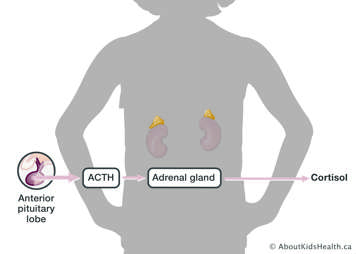What is hypopituitarism?

Hormones are chemicals produced in the body. They act as messengers that travel to other parts of the body where they affect how organs work. Hypopituitarism is a condition where the pituitary gland does not produce one or more pituitary hormones, or it does not produce enough hormones. “Hypo” means less than usual. The term “panhypopituitarism” means many or all of these hormones are deficient ("pan" means all).
The pituitary is a pea-sized gland located in the middle of the skull. It is part of the body’s endocrine system, which includes all the glands that produce and regulate hormones. The pituitary gland acts as the control centre for other glands. Hormones produced in the pituitary gland impact many other parts of the body. The pituitary releases various hormones in response to chemical messages it receives from the part of the brain called the hypothalamus.
What is adrenocorticotrophic hormone deficiency?
In most people, the pituitary gland releases ACTH, which signals to the adrenal glands to produce cortisol. The two adrenal glands are located on top of the kidneys in the middle of the back. A lack of the pituitary hormone ACTH results in a lack of cortisol being made and released by the adrenal glands. This is also known as adrenal insufficiency.

Cortisol helps to keep the body’s blood sugar at a normal level and helps the body deal with physical stress, such as fever or injury. Cortisol is normally released by the adrenal glands in a certain pattern that varies throughout the day. This is called the diurnal/circadian rhythm. This means that the highest release is early in the morning just as you wake up, and the lowest release is in the late evening and overnight hours. However, in people with ACTH deficiency, the adrenal glands do not get the signal to produce cortisol.
How is ACTH deficiency diagnosed?
Several ways your doctor determines if your child is unable to make adequate amounts of cortisol are:
- evaluating symptoms, which include changes in the way your child feels, how well they keep up with daily activities and how well they tolerate illness (e.g., daytime fatigue, nausea, headaches and/or dizziness)
- physical examination, including height and weight measurements
- blood tests to measure amounts of cortisol
How is ACTH deficiency treated?
If too little cortisol is being made, a synthetic form of cortisol called hydrocortisone (Cortef) is prescribed. Hydrocortisone is available in a liquid or pill form and is taken 2 to 3 times daily for your child’s entire life. The pill and liquid form of hydrocortisone should be stored at room temperature. Note: the liquid form expires 60 days from the date of manufacture.
If your child misses a dose of hydrocortisone in the afternoon, they may have a headache or fatigue in the evening. If they miss a dose in the evening or if it was taken too early, then they may have a headache or fatigue in the morning. The dose prescribed will be adequate for normal daily activities when your child is well. If for any reason your child cannot take the medication by mouth, it must be injected.
Managing illness
Children with ACTH deficiency are not able to produce the extra cortisol the body needs during illness. Illnesses requiring extra hydrocortisone include fevers above 101°F or 39°C, throat or ear infections, nausea, or illnesses causing lethargy (lack of energy), pale cold clammy skin, lower than normal body temperature, or any signs of dehydration.
There can be times when physical stresses may require giving a higher dose of hydrocortisone. Some of these situations include broken bones, injuries requiring stitches, or surgery, including some dental procedures.
Extra hydrocortisone is not needed for routine immunizations but is needed if your child develops a fever after receiving an immunization. You will be taught by your health-care team how to give extra hydrocortisone during these times.
It is very important that the dosage of hydrocortisone be increased with fever, some illnesses, and injuries. Guidelines for handling these situations are outlined in a separate handout called “Your child’s cortisol replacement instructions”. You can get this at each clinic visit. Your health-care team will review this important information with you regularly.
It is important to be aware of the symptoms that may indicate too little or too much cortisol (hydrocortisone).
| Too little cortisol (not enough hydrocortisone medication) | Too much cortisol (too much hydrocortisone medication) |
|---|---|
|
|
If your child has ACTH deficiency, it is recommended that they wear a Medical Alert Device that reads "adrenal insufficiency".
Cortisol replacement does not make children more susceptible to colds or other contagious diseases and does not interfere with routine immunizations. Children should receive their immunizations on schedule.